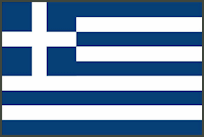Greece / Hellenic Republic
 Greece is the Roman name for this country. The Greeks call themselves Hellenes, and their own country Hellas. Greece is a member of the North Atlantic Treaty Organization and the European Economic Community. Greece and the US are defense partners, and the US provides Greece with considerable military assistance.
Greece is the Roman name for this country. The Greeks call themselves Hellenes, and their own country Hellas. Greece is a member of the North Atlantic Treaty Organization and the European Economic Community. Greece and the US are defense partners, and the US provides Greece with considerable military assistance.
Greek society as a whole suffers tremendously from the inefficiencies related to corruption, which appear to be endemic, and unlikely to be reduced significantly any time soon. Efforts to reform and rebuild Greece’s economy in the future will be undermined because the country’s government, businesses and civil servants not only fail to stop corruption but actively participate in it. Many attribute the unusually high level of corruption in Greece, at least by Western European norms, largely to cultural causes. Because of its deeply ingrained nature, it was difficult to convince Greeks that corruption could be changed: Greeks are raised to believe Greece is the "poor relative" of the EU where Western European modes of behavior don't fit. "Ti na kanoume, Ellada einai" (What can you do, this is Greece) is a pervasive attitude resulting from Greece being cut off physically and historically from the rest of Western Europe.
Of particular note is the lack of trust within Greek society, which even characterized relations between close family members. This tendency leads Greeks to assume others are trying to outwit them, leading everyone to try to outwit others first. One of the greatest compliments a Greek can pay another Greek is to praise their "poniria", or ability to outwit others. Most politicians, once they've been in power for a while, begin to accept the system as it is. This doesn't mean they're corrupt, just human. Although corruption in Greece was rampant at all levels, it is especially bad at the day-to-day level involving activities such as obtaining building permits and dealing with customs officials. The average Greek politician is great at formulating complex laws that regulate things that don't need regulating, and doing so in the most complicated manner possible.
Greece's allocation of gross domestic product (GDP) for defense is the highest in the European Union (EU). A partner in the North Atlantic Treaty Organization (NATO), Greece is continuing to modernize the Hellenic Armed Forces and shift its force structure toward smaller, more flexible formations. To achieve this, the government has announced plans to spend more than $3 billion by 2011, in addition to the $8 billion it has spent in recent years on defense equipment.
Greece provides U.S. defense firms with excellent opportunities as it pursues a number of high-priority programs, including new frigates, helicopters, missiles, fighters and "new generation" trainer aircraft. It is estimated that U.S. firms could capture up to $2 billion in business under this modernization program. To take full advantage of these opportunities, U.S. firms must understand the complexities of the Greek market, including its often-unpredictable tendering process, as well as the competition from the EU and other areas. In this regard, a local consultant or partner is essential.
The terrorist attacks in New York, Madrid and London, increasing attacks on businesses, and the recent attack on the U.S. Embassy in Athens, led to an important change in Greece's - and other countries' - attitudes towards security and counter-terrorism. The necessity for more and better security has resulted in increased market potential associated with the upgrading of Greek airport and port security, to be funded from the Greek national budget, EU funds, the Interregional Plan, and public-private partnerships.
Greece has contributed approximately 150 engineers and headquarters staff to the International Security Assistance Force (ISAF) in Afghanistan, though it is currently adjusting its contribution to meet new mission requirements. Greece assumed command of Kabul airport for a six-month rotation starting in April 2010. Greece provided over 67 million euros in development and humanitarian aid to Afghanistan between 2002-2008.
Greece's special political and economic relationships with countries in the Balkans play an important role in reinforcing democratic development there. The country has made positive contributions to Balkans reconciliation through its involvement in the NATO-led Kosovo Force (KFOR), NATO's long-running SFOR mission in Bosnia, and SFOR's follow-on mission, the EU's operation "Althea." There are presently 44 staff members in Althea and 366 Greek troops supporting KFOR.
Greece has been an active participant in NATO's Ocean Shield counter-piracy operation providing protection for World Food Program chartered and merchant vessels off the coast of Somalia, and routinely contributes to NATO maritime operations. Greece previously led, and it continues to participate in, the European Union's "Atalanta" counter-piracy missions. The U.S. Navy's naval support base at Souda Bay on the island of Crete provides operational and logistical support to European Command (EUCOM), Central Command (CENTCOM), the Fifth and Sixth fleets, and NATO forces engaged in missions in Iraq, Afghanistan, the Balkans, and the Middle East.
|
NEWSLETTER
|
| Join the GlobalSecurity.org mailing list |
|
|
|

